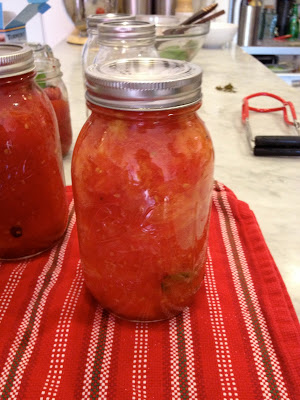I have been interested in canning and preserving for awhile. I can remember when I was younger my Mom was always canning and preserving fresh fruits and vegetables from her garden. We had a whole wall of shelves in our basement that had jars filled with pickles, relish, tomatoes, etc.
Since we moved to New York I have been increasingly curious about canning and preserving since there are so many amazing farmers markets with fresh, seasonal fruits and vegetables. A few months back I purchased an inexpensive "Guide to Preserving" book. I was so excited to read, learn and begin canning!
As I was reading I kept seeing warnings about botulism, mold, and salmonella. You also have to know when to use the boiling-water vs. the pressure method and make sure there is enough acid and jar headspace to ensure it is safe and nothing spoils. Then the book lays out all the equipment needed including "produce protector" and dissolvable labels and warns if you don't follow their recipes EXACTLY you may die!** Needless to say I was overwhelmed, defeated and scared. I stored the book away and just relegated myself to the fact that canning and preserving wasn't for me.
Fast-forward a few months and I am chatting with my sister Heather (she is actually my brother's- wife's-sister, but we are all very close and I consider her my sister) about canning since she is an expert chef, baker, entertainer, lawyer and all around amazing person who has also been canning and preserving all sorts of goodies for many years! I explained to her my disappointment at how hard and complicated canning and preserving seemed. Being the awesome person she is, she invited me over to her house for a fun day of canning tomatoes that were just about to come into season. This was a no-brainer for me...I of course said yes and was so thankful that not only was she going to show me how to can tomatoes, but was also gracious enough to let me bring my own tomatoes to can and use all of her equipment and beautiful kitchen.
I arrived with 3 large mason jars, 12 good size tomatoes and of course Champagne (I did say it was a fun day of canning!) Heather was canning whole tomatoes and had already began roasted them in the oven. She explained to me that we had to boil the jars and the tops first to sanitize and keep them from cracking. I decided I was going to do crushed tomatoes, so we boiled them, put them in an ice bath, peeled and then hand crushed them in a bowl. Then, following instructions from one of Heather's canning books, we put some fresh squeezed lemon and salt into our jars and began adding the tomatoes. I was surprised that all 12 of my crushed tomatoes fit into 1 jar! Heather showed me how much space to leave at the top and how to remove air bubbles. We then put the lids on the jars and placed them on the rack in the boiling for the instructed amount of time and voila! we were done.
It was much simpler and more straight forward that I thought, although I also had a fabulous teacher!
Heather was patient enough to explain to me what is necessary to do when canning in order to be safe and avoid spoilage and getting sick. I learned that following recipe instructions based on certain fruits and vegetable acidity levels is extremely important, but is not as intimidating as I previously thought. I had a fantastic time and although I am clearly not an expert canner/preserver I would definitely feel more comfortable trying it on my own...I Can, Can, Can, Can! Now of course I also have Heather around to ask questions and borrow books from which is a bonus! Before I left we chatted about trying to get together in the next few months and experiment with making and preserving ketchup which I am really looking forward to - I will definitely post how that turns out! I have just began my canning/preserving journey, but I am looking forward to where it will take me and of course will be update you on my progress!
Check out the pictures below of my first experience canning tomatoes. I would also love to hear from you about any of your canning recipes, tips, ideas and books you like!
 |
| My first jar of canned crushed tomatoes! (Well my first jar of canned anything for that matter :) |








